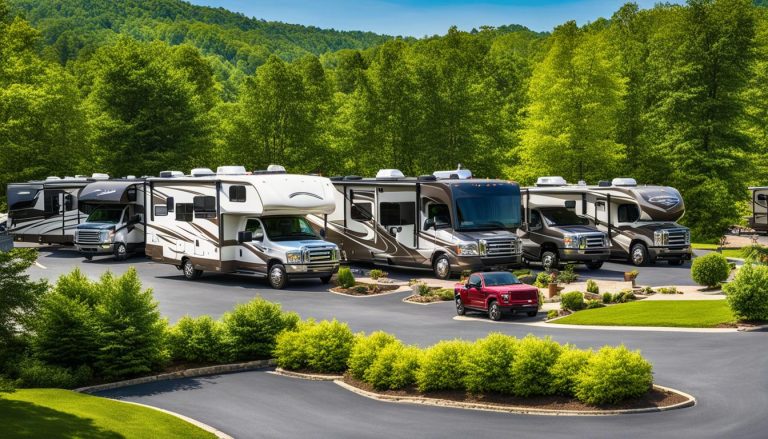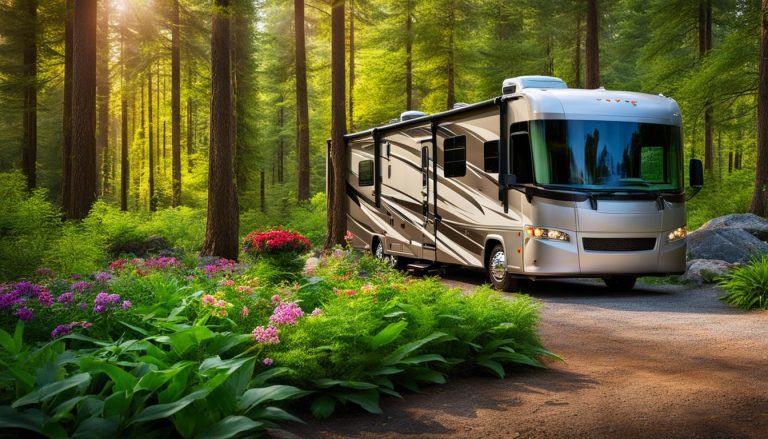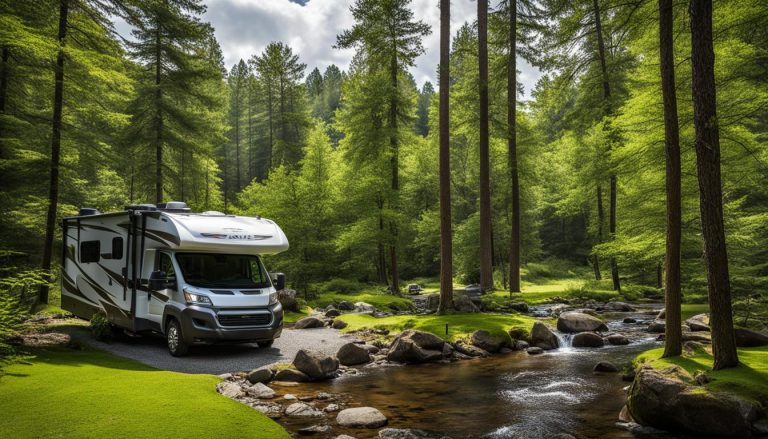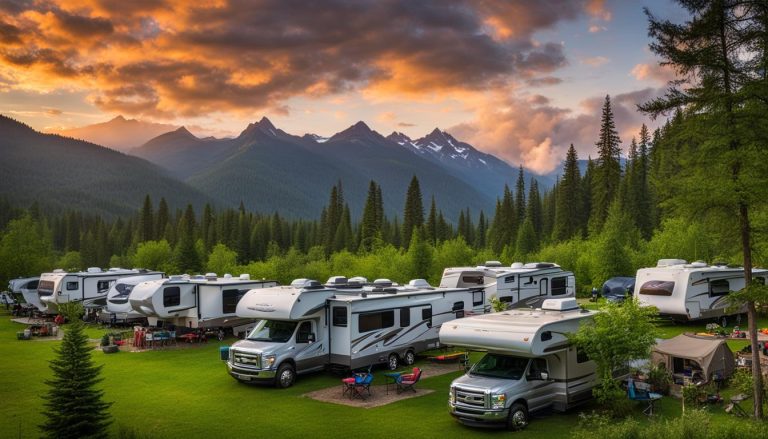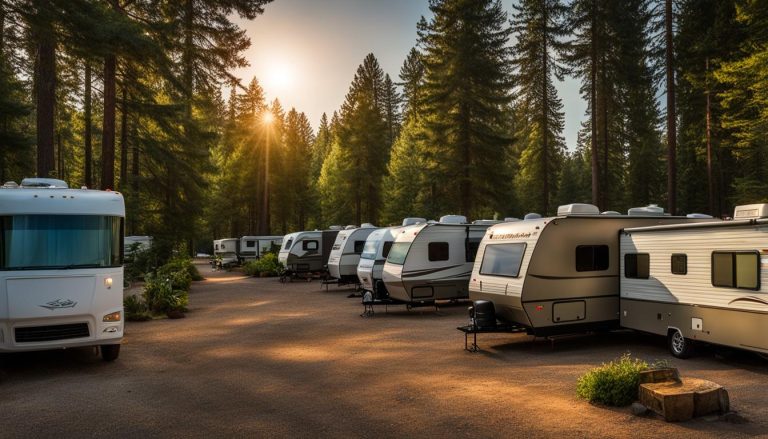Uncover the Best WiFi for RV Parks – Stay Connected On the Go!
gorvlifestyle.com and its partners may earn a commission if you purchase a product through one of our links
RV ownership has increased by 62% in the last 20 years, and over 11.2 million American households own an RV. Whether you’re planning a cross-country trip or living a mobile lifestyle, staying connected is essential. There are different internet options for RVs, including satellite internet, mobile hotspots, campground WiFi, and cellular data.
Satellite internet, such as Starlink, Viasat, and HughesNet, offers a reliable connection for remote areas, while mobile hotspots from providers like AT&T, Verizon, and T-Mobile provide internet access through cellular data. Campground WiFi is available at some RV parks, but it can be slow and unreliable. Cellular data plans and WiFi extenders can help boost your signal. Consider your internet needs and location when choosing the best WiFi option for your RV.
Key Takeaways:
- RV ownership has increased by 62% in the last 20 years.
- There are different internet options for RVs, including satellite internet, mobile hotspots, campground WiFi, and cellular data.
- Satellite internet offers a reliable connection for remote areas, while mobile hotspots provide internet access through cellular data.
- Campground WiFi can be slow and unreliable, but cellular data plans and WiFi extenders can help boost your signal.
- Consider your internet needs and location when choosing the best WiFi option for your RV.
Satellite Internet for RVs: Reliable Internet Access Anywhere
If you plan to stay in one place for a long time, satellite internet is a great option for RV parks. Providers like Starlink, Viasat, and HughesNet offer satellite internet plans specifically designed for RVs. With satellite internet, you can enjoy reliable and fast Wi-Fi connectivity no matter where you are.
Starlink, a popular choice among RVers, offers high-speed internet with speeds of up to 220 Mbps while in motion. However, it’s important to note that Starlink requires a significant upfront hardware fee for installation. On the other hand, Viasat and HughesNet have nationwide coverage and offer data plans that won’t cut you off after you reach your data limit. However, these providers may throttle your speeds once you surpass a certain threshold.
Keep in mind that satellite internet requires a clear view of the sky, so it may not be available while you’re on the move. If you rely on campground Wi-Fi as your primary connection, Wi-Fi extenders can help improve the signal quality. These devices can enhance your Wi-Fi range and ensure a more stable connection.
Benefits of Satellite Internet for RV Parks:
- Reliable internet access in remote areas
- High-speed connectivity options
- Nationwide coverage with certain providers
- No data cutoff after reaching your limit
Satellite internet is a game-changer for RVers who want to stay connected no matter where they are. With reliable internet access, you can stream movies, work remotely, and stay connected with friends and family while on the road.
If you’re considering satellite internet for your RV, make sure to evaluate the hardware and data plans offered by different providers. Consider your data usage needs, location, and budget to choose the best satellite internet option that suits your needs. With satellite internet, you can enjoy the freedom of the open road while staying connected to the digital world.
Mobile Hotspots: Stay Connected with Cellular Data
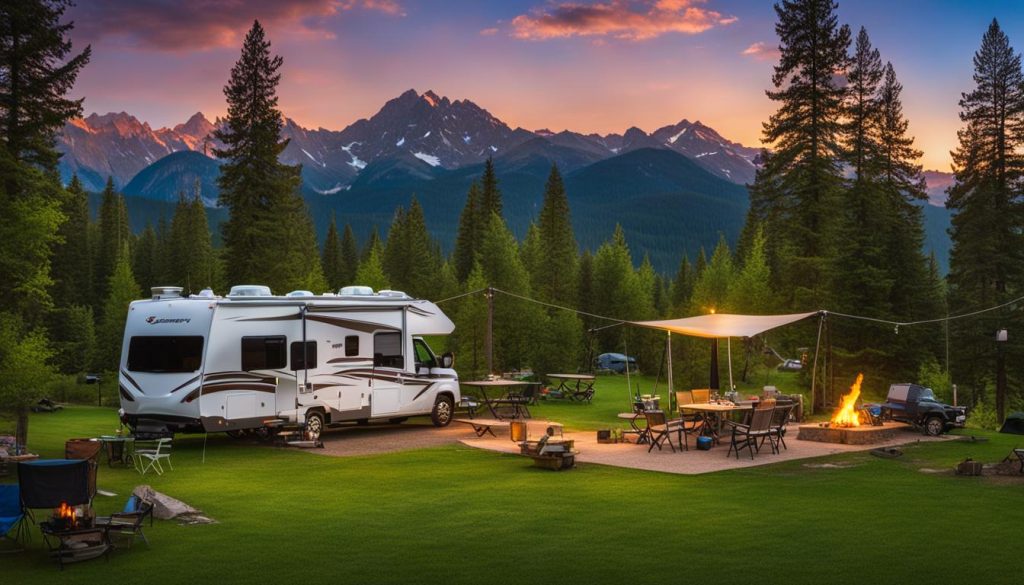
When it comes to staying connected while on the go in your RV, mobile hotspots can be a reliable option. With a mobile hotspot, you can connect your devices to the internet using cellular data, keeping you connected wherever you travel.
Providers such as AT&T, Verizon, and T-Mobile offer mobile hotspot plans specifically designed for RVers. These plans come with varying amounts of data, allowing you to choose the one that best fits your needs. Whether you require a small amount of data for basic internet browsing or unlimited data for streaming and gaming, there is a plan available for you.
One of the advantages of using a mobile hotspot is its portability. You can take your hotspot with you wherever you go, ensuring that you have internet access at all times. However, it’s important to note that the coverage of cellular networks may vary depending on your location. Before selecting a mobile hotspot plan, it’s recommended to check the coverage maps of the providers in the areas you plan to visit.
“Mobile hotspots are a popular choice for RVers who need internet access on the go.”
Benefits of Mobile Hotspots
There are several benefits to using a mobile hotspot for RV internet access:
- Flexibility: With a mobile hotspot, you have the flexibility to connect multiple devices to the internet at the same time. Whether you’re using your smartphone, tablet, laptop, or smart TV, you can easily connect them all to your hotspot.
- Reliability: Mobile hotspots provide a reliable connection as they use cellular networks. You don’t have to rely on campground Wi-Fi or worry about slow speeds and unreliable connections.
- Security: Using a mobile hotspot ensures that your internet connection is secure. Public Wi-Fi networks can be vulnerable to hacking, but with a mobile hotspot, you have your own private network.
Overall, mobile hotspots are a convenient and dependable option for RVers who require internet access while on the move. They provide the flexibility, reliability, and security needed to stay connected and enjoy fast Wi-Fi in your RV parks and wherever your travels take you.
Campground WiFi: Free but Unreliable Internet
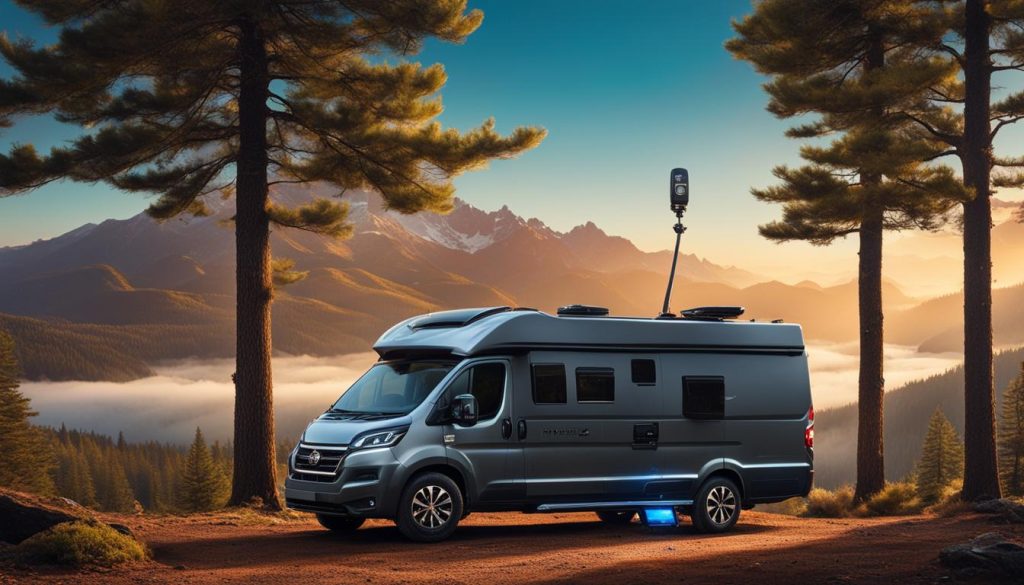
Many RV campgrounds offer free Wi-Fi connections for campers. While this can be a convenient and cost-effective option, campground Wi-Fi can be slow and unreliable due to the number of users and the distance from the Wi-Fi router. In some cases, you may need a Wi-Fi extender to boost the signal and improve your connection. Additionally, public Wi-Fi networks pose security risks, so it’s important to take precautions when using them. Consider campground Wi-Fi as a secondary option or for casual internet use, but have a backup plan in case the connection is not sufficient for your needs.
If you rely heavily on internet access for work, streaming, or online gaming, campground Wi-Fi may not meet your requirements. The limited bandwidth and shared connection can result in slow speeds and frequent disruptions. This can be frustrating, especially if you depend on a reliable internet connection during your RV travels. It’s important to understand the limitations of campground Wi-Fi and explore alternative options for a consistently better internet experience.
While campground Wi-Fi may not be the most reliable option, it can still be useful for basic internet activities such as checking emails, browsing the web, or staying connected on social media. If you’re planning to use campground Wi-Fi, it’s recommended to have a Wi-Fi extender to improve the signal strength. A Wi-Fi extender can help boost the Wi-Fi signal and increase the range, allowing you to access the internet from a greater distance.
However, keep in mind that using campground Wi-Fi comes with certain limitations and risks. Public Wi-Fi networks are often unsecured, making them vulnerable to hackers and cyberattacks. It’s essential to take precautions such as using a VPN (Virtual Private Network) to encrypt your data and protect your privacy. Additionally, it’s advisable to avoid accessing sensitive information or making online transactions while connected to campground Wi-Fi. Prioritize your internet security and consider investing in a more reliable internet option for your RV needs.
Table: Pros and Cons of Campground WiFi
| Pros | Cons |
|---|---|
| Convenient and cost-effective | Slow and unreliable |
| Accessible in some RV campgrounds | Limited bandwidth |
| Potential for Wi-Fi extenders to improve signal strength | Shared connection with other campers |
| Useful for basic internet activities | Security risks on public networks |
Cellular Data and WiFi Hotspots: Flexible Options for RV Internet
If you already have internet service at home, you’re in luck! You can utilize your provider’s Wi-Fi hotspot network or turn your phone into a mobile hotspot to have internet access on your RV travels. Providers like Spectrum, Xfinity, and AT&T offer Wi-Fi hotspots with nationwide coverage. This means you can stay connected to the internet wherever you go without worrying about finding a reliable connection.
Some mobile carriers, such as AT&T, Verizon, and T-Mobile, also offer cellular data and mobile hotspot plans specifically designed for RVers. These plans come with varying data limits, so you can choose the one that suits your needs. If you require a consistent internet connection while on the road, unlimited plans can be a great choice. Just keep in mind that some providers may impose coverage limitations or charge overage costs if you exceed your data limit.
If you have more advanced internet needs, like video conferencing or gaming, consider investing in a cellular router with a modem. This will provide you with faster and more reliable internet access compared to traditional Wi-Fi hotspots. Another option to explore is Nomad Internet, which offers cellular internet from multiple carriers specifically tailored for traveling nomads. However, keep in mind that this option tends to come at a higher price.
When choosing an internet option for your RV, it’s essential to consider your needs and the level of reliable connectivity required for your lifestyle. Stay connected and enjoy the flexibility of cellular data and Wi-Fi hotspots while camping in your RV!

